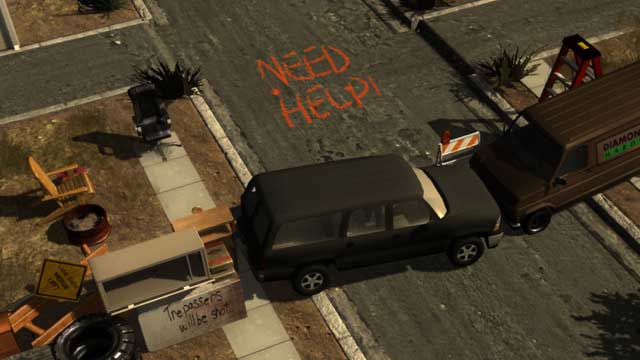Dead State blends zombie sandbox trends with old-school RPG heart
Dead State takes a long strand of narrative-driven RPG DNA and bolts it onto a zombie survival sandbox. Brenna finds the result compellingly familiar.
I backed Dead State on Kickstarter because when the campaign first launched in June 2012, the team said this:
"DoubleBear Productions is an indie RPG developer founded by Brian Mitsoda (formerly of Black Isle, Troika, and Obsidian)."
That middle name in particular is a good one. Troika! Remember Troika? Y-you don't? You don't remember Troika? Let me refresh your memory:
- Arcanum: Of Steamworks and Magick Obscura (2001)
- The Temple of Elemental Evil (2003)
- Vampire: The Masquerade – Bloodlines (2004)
Oh yeah, there you go.
Troika shares DNA with a number of related studios, such as Black Isle Entertainment and most especially the key Fallout team at Interplay Entertainment. It's part of the sprawling family who brought us a new generation of RPG masters, including BioWare, Obsidian Entertainment and inXile Entertainment.
Those last two have gone on to capitalise on their strong nostalgic fanbases and the Kickstarter revolution to bring back old-school RPGs in a big way - Torment: Tides of Numenera, Pillars of Eternity and Wasteland 2. Mitsoda, along with his DoubleBear co-founder and fellow Obsidian veteran Annie VanderMeer Mitsoda, is doing things a little more quietly, but no less interestingly.
Dead State is, yes, another zombie survival sandbox, but this one isn't about shooting and crafting - well, not just about those things. In this early alpha stage, it looks to be shaping up into something pretty cool: a game where characters really matter, and caring about them means more than min-maxing their stats.
Although Dead State lets you create a character to represent you in-game, it's definitely a party RPG. Which three characters you take with you into battle or assign to tasks at home matters tactically, but it's not just about picking the right mix of skills and progressing characters carefully. You'll also need to keep an eye on your compatriots' morale.
Keeping the food and luxury stocks high will help here, of course, but you'll do even better if you actually talk to your group and get to know them. Not only do they reveal more detailed information about their abilities and predilections than the stat screens, they'll also voice their troubles and let you know what they might need to give them a mood boost. Chocolate and deodorants are a favourite, but other characters have more complex needs.
It's important to do what you can to address and resolve issues with the growing group of survivors because an uncooperative member is a drain on resources, and you'll need everything you can find to keep the shelter running. The ever-present threat of the fence coming down, along with sourcing food, is stressful, and venturing out to seek resources drains your medical supplies thanks to attacks from zombies and looters. Eventually, you'll need to travel further afield to find goods - and that means fuel for cars, as well as better gear to combat nastier threats.
This all sounds very gamey indeed, but through it all a vein of story-telling and character-driven drama shines through. Although the alpha demo doesn't include character customisation (instead, you play as Brian Mitsoda's avatar, which is kind of cool) the opening dialogue does contain a hint of the flexibility a game like this provides. When the main character awakes after a plane crash and learns of the situation, they're given a significant number of dialogue options about a possible loved one on the plane. In a voiced game with cut-scenes you'd never get the choice of husband, wife, girlfriend, boyfriend, partner and what have you - with no restrictions on gender, by the way.
Even if they're just there for atmosphere, the significant number of dialogue options are a super cool touch that cost DoubleBear very little to implement and reminded me why old-school RPGs were so great, despite all the readin'.
I haven't played enough yet to learn if these choices have much impact beyond the player's own personal satisfaction at filling out a customised backstory (the demo only goes for seven days), but even if they're just there for atmosphere, it's a super cool touch that cost DoubleBear very little to implement and reminded me why old-school RPGs were so great, despite all the readin'.
What this actually reminded me most strongly of was Fallout, which is not at all surprising, as that series was Troika's genesis. The apocalyptic scenario (partially inspired by Mitsoda's experiences during and after Hurricane Andrew) is the most obvious comparison, but the turn-based combat, movement grid, inventory management and character building all harken back to the CRPG era. So to does the narrative and focus on individual characters forming a party, balancing their individual needs with the group and protagonist's goals.
It must be said that Dead State doesn't do it with as much pizazz as those classic games, though; unlike Fallout and its ilk, this is not a triple-A published game, and more importantly, nor is it finished.
Don't rush off to buy Dead State right now; the early-access demo is rough, to say the least, with a tremendously shitty interface, loads of missing features, and very little guidance as to how to perform basic tasks like leaving the shelter (the bristling manual answers many questions, but not all of them). But if you are in the CRPG camp it's worth keeping an eye on, because the finished, polished product could well be something very special.


